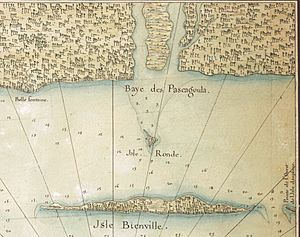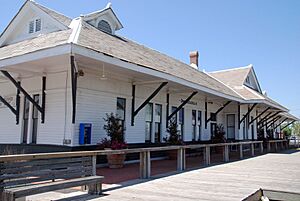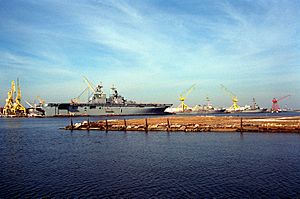Pascagoula, Mississippi facts for kids
Quick facts for kids
Pascagoula, Mississippi
|
|||
|---|---|---|---|
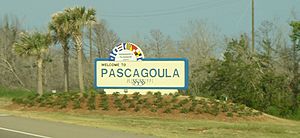
Welcome sign on U.S. Route 90
|
|||
|
|||
| Nickname(s):
Mississippi's Flagship City
|
|||
| Motto(s):
"A Great Place to Live, Work & Play"
|
|||
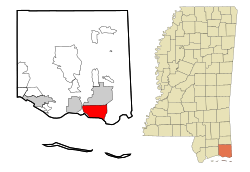
Location of Pascagoula in Jackson County, Mississippi
|
|||
| Country | United States | ||
| State | Mississippi | ||
| County | Jackson | ||
| Area | |||
| • City | 24.51 sq mi (63.48 km2) | ||
| • Land | 15.38 sq mi (39.82 km2) | ||
| • Water | 9.13 sq mi (23.66 km2) | ||
| Elevation | 10 ft (3 m) | ||
| Population
(2020)
|
|||
| • City | 22,010 | ||
| • Density | 1,431.45/sq mi (552.68/km2) | ||
| • Urban | 50,428 (US: 497th) | ||
| • Metro | 382,516 (US: 137th) | ||
| Time zone | UTC−6 (Central (CST)) | ||
| • Summer (DST) | UTC−5 (CDT) | ||
| ZIP codes |
39567-39581
|
||
| Area code(s) | 228 | ||
| FIPS code | 28-55360 | ||
| GNIS feature ID | 0675480 | ||
Pascagoula is a city in Jackson County, Mississippi, United States. It is the main city of the Pascagoula metropolitan area. The city is also part of the larger Gulfport–Biloxi–Pascagoula area. In 2020, about 22,010 people lived there.
Pascagoula is served by three airports. These include Mobile Regional Airport in Alabama and Gulfport-Biloxi International Airport. There is also the Trent Lott International Airport nearby.
Contents
History of Pascagoula
Early Beginnings
The name Pascagoula comes from a Native American group. These people were called the Pascagoula, which means "bread eater." They lived in villages along the Pascagoula River.
One of the first Europeans to meet them was Hernando de Soto in the 1540s. Later, Pierre Le Moyne d'Iberville, who founded the colony of Louisiana, explored the area in 1700. His younger brother, Jean-Baptiste Le Moyne de Bienville, also met the Pascagoula people. Their language was different from other large native groups like the Choctaw.
The first European settlers in Pascagoula included Jean Baptiste Baudreau Dit Graveline.
Modern Times
Over the next century, the Pascagoula region was controlled by different countries. It was held by the English, French, and Spanish. In 1812, it officially became part of the United States.
Pascagoula became a village in 1892 and a city in 1901. The downtown area of Pascagoula used to be a separate town called Scranton. The two towns joined together in 1904.
In 1973, something unusual happened in Pascagoula. Two co-workers, Charles Hickson and Calvin Parker, claimed they were taken by UFOs while fishing. This event, known as the Pascagoula Abduction, got a lot of attention. Today, Pascagoula has a historical marker near the site. The city even celebrates this event each year with a festival called Goula Palooza.
Hurricane Katrina's Impact
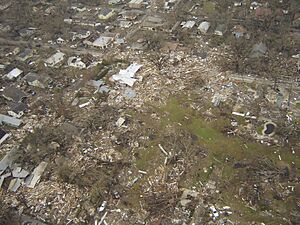
On August 29, 2005, Hurricane Katrina hit Pascagoula very hard. A huge storm surge of about 20 feet flooded almost 92% of the city. Many homes along Beach Boulevard were destroyed.
The storm caused a lot of damage to buildings and homes. Many people in Pascagoula did not have flood insurance. This made rebuilding their homes very difficult. The storm also damaged two large Navy ships that were being built in Pascagoula. Over forty libraries in Mississippi were damaged, including the Pascagoula Public Library.
Places to Visit
Pascagoula is home to the Old Spanish Fort. This is the oldest building in the Mississippi Valley, built around the 1750s.
The United States post office in Pascagoula has a special mural. It is called Legend of the Singing River and was painted in 1939. The mural was damaged by Hurricane Katrina but was later restored and moved to the new Pascagoula post office.
City Geography
Pascagoula is located along Mississippi Sound. It is on the east side of where the Pascagoula River meets the sea. To the north, it borders Moss Point. To the west, across the river, is Gautier.
The city covers about 63.4 square kilometers (24.5 square miles). A large part of this area is water. U.S. Route 90 goes through the city. This road connects Pascagoula to other towns like Grand Bay, Alabama and Biloxi.
Climate and Weather
Pascagoula has a humid subtropical climate. This means it has hot, humid summers and mild winters. The hottest temperature ever recorded in Pascagoula was 106°F (41°C) in August 2023. The coldest temperature was 16°F (-9°C) in January 2014.
| Climate data for Pascagoula, Mississippi (Trent Lott International Airport), 1991–2020 normals, extremes 1997–present | |||||||||||||
|---|---|---|---|---|---|---|---|---|---|---|---|---|---|
| Month | Jan | Feb | Mar | Apr | May | Jun | Jul | Aug | Sep | Oct | Nov | Dec | Year |
| Record high °F (°C) | 83 (28) |
84 (29) |
89 (32) |
93 (34) |
97 (36) |
102 (39) |
103 (39) |
106 (41) |
99 (37) |
98 (37) |
88 (31) |
84 (29) |
106 (41) |
| Mean maximum °F (°C) | 76.1 (24.5) |
78.9 (26.1) |
82.9 (28.3) |
85.9 (29.9) |
92.8 (33.8) |
96.7 (35.9) |
97.1 (36.2) |
96.7 (35.9) |
94.2 (34.6) |
90.5 (32.5) |
82.7 (28.2) |
79.0 (26.1) |
98.7 (37.1) |
| Mean daily maximum °F (°C) | 62.5 (16.9) |
66.4 (19.1) |
72.2 (22.3) |
77.6 (25.3) |
84.3 (29.1) |
89.6 (32.0) |
90.9 (32.7) |
90.7 (32.6) |
88.0 (31.1) |
80.7 (27.1) |
71.4 (21.9) |
64.8 (18.2) |
78.3 (25.7) |
| Daily mean °F (°C) | 51.7 (10.9) |
55.5 (13.1) |
61.2 (16.2) |
66.6 (19.2) |
73.6 (23.1) |
80.3 (26.8) |
82.1 (27.8) |
81.9 (27.7) |
78.5 (25.8) |
69.2 (20.7) |
59.1 (15.1) |
54.0 (12.2) |
67.8 (19.9) |
| Mean daily minimum °F (°C) | 40.9 (4.9) |
44.6 (7.0) |
50.1 (10.1) |
55.7 (13.2) |
63.0 (17.2) |
71.1 (21.7) |
73.4 (23.0) |
73.2 (22.9) |
69.0 (20.6) |
57.7 (14.3) |
46.9 (8.3) |
43.2 (6.2) |
57.4 (14.1) |
| Mean minimum °F (°C) | 22.3 (−5.4) |
27.4 (−2.6) |
32.1 (0.1) |
39.8 (4.3) |
48.8 (9.3) |
62.8 (17.1) |
67.8 (19.9) |
66.8 (19.3) |
56.1 (13.4) |
39.9 (4.4) |
28.9 (−1.7) |
27.3 (−2.6) |
21.9 (−5.6) |
| Record low °F (°C) | 16 (−9) |
20 (−7) |
21 (−6) |
32 (0) |
42 (6) |
50 (10) |
60 (16) |
60 (16) |
45 (7) |
29 (−2) |
19 (−7) |
20 (−7) |
16 (−9) |
| Average precipitation inches (mm) | 4.97 (126) |
4.01 (102) |
4.73 (120) |
4.40 (112) |
4.95 (126) |
6.91 (176) |
6.65 (169) |
7.89 (200) |
4.84 (123) |
3.69 (94) |
3.79 (96) |
4.90 (124) |
61.73 (1,568) |
| Average precipitation days (≥ 0.01 in) | 8.3 | 8.9 | 8.5 | 7.3 | 7.7 | 12.3 | 14.8 | 14.8 | 10.4 | 8.0 | 7.5 | 9.4 | 117.9 |
| Source 1: NOAA | |||||||||||||
| Source 2: National Weather Service (mean maxima/minima 2006–2020) | |||||||||||||
Population Facts
| Historical population | |||
|---|---|---|---|
| Census | Pop. | %± | |
| 1870 | 480 | — | |
| 1880 | 418 | −12.9% | |
| 1900 | 708 | — | |
| 1910 | 3,379 | 377.3% | |
| 1920 | 6,082 | 80.0% | |
| 1930 | 4,339 | −28.7% | |
| 1940 | 5,900 | 36.0% | |
| 1950 | 10,805 | 83.1% | |
| 1960 | 17,155 | 58.8% | |
| 1970 | 27,264 | 58.9% | |
| 1980 | 29,318 | 7.5% | |
| 1990 | 25,899 | −11.7% | |
| 2000 | 26,200 | 1.2% | |
| 2010 | 22,392 | −14.5% | |
| 2020 | 22,010 | −1.7% | |
| U.S. Decennial Census 2018 Estimate |
|||
2020 Census Information
The 2020 United States census counted 22,010 people living in Pascagoula. There were 8,415 households and 4,865 families.
| Race | Num. | Perc. |
|---|---|---|
| White (non-Hispanic) | 10,272 | 46.67% |
| Black or African American (non-Hispanic) | 7,561 | 34.35% |
| Native American | 51 | 0.23% |
| Asian | 152 | 0.69% |
| Pacific Islander | 3 | 0.01% |
| Other/Mixed | 717 | 3.26% |
| Hispanic or Latino | 3,254 | 14.78% |
Economy and Jobs
Pascagoula is an important industrial city in Mississippi. Before World War II, it was a small fishing village. But the war brought a big increase in shipbuilding. This caused the city's population to grow quickly.
Today, Pascagoula is home to Ingalls Shipbuilding. This is the largest private employer in Mississippi at one location. Other big industries include a large Chevron refinery and Rolls-Royce Naval Marine. Rolls-Royce works on ship engines for the U.S. Navy.
Naval Station Pascagoula used to be a homeport for Navy warships. It also had a large Coast Guard group. However, it was closed in 2006.
Education in Pascagoula
The Pascagoula-Gautier School District serves the city of Pascagoula. There is also Resurrection Catholic School. This is a private school for students from pre-kindergarten through 12th grade. It was started in 1882.
Famous People from Pascagoula
Many notable people have connections to Pascagoula:
- Brent Anderson, a country music singer
- Vick Ballard, an NFL football player
- Jimmy Buffett, a famous musician, songwriter, and author, was born here
- Terrell Buckley, an NFL football player
- Trent Lott, a former U.S. Senator
- Shane Matthews, an NFL football player
- Jennifer Palmieri, a politician
- Channing Tatum, a well-known actor
- Sarah Thomas, the first female NFL official
Sister City
Pascagoula has one sister city:
 – Chico, California (U.S.)
– Chico, California (U.S.)
See also
 In Spanish: Pascagoula para niños
In Spanish: Pascagoula para niños
 | Janet Taylor Pickett |
 | Synthia Saint James |
 | Howardena Pindell |
 | Faith Ringgold |





